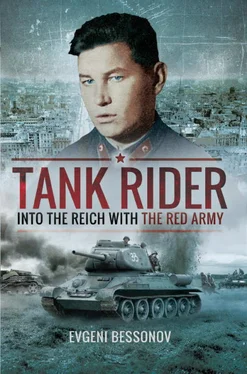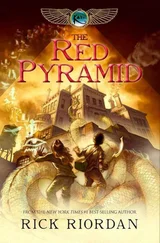My platoon attacked some sort of a factory, as it turned out later, a distillery. The enemy stopped us with heavy small arms fire, and we had to lie down in the swamp. We did not suffer losses, but the enemy’s fire prevented us from advancing further, especially because in front we could see the stone wall of the factory. We could not see the enemy, while we ourselves lay exposed. As soon as the Fritzes spotted any movement in our lines, they fired, forcing me and my soldiers to lie completely still. It took me a lot of effort to make it to a dry spot, seven or eight soldiers made it out of the swamp with me. We ran behind a house and started to look around, trying to find a way to drive Fritzes out of the factory’s brick buildings.
I ran forward on dry land, trying to find a better way to attack the enemy, and show the soldiers, who were stuck in the swamp, a route of retreat to a dry place. The Fritzes noticed me and opened fire on me, not from small arms, as it was usually, but from a small-calibre mortar, apparently a company mortar. We encountered such mortars sometimes, although they quickly disappeared. Shells exploded not far from me. I ran, paying no attention to the fire on me. I ran as fast as my feet could carry me, while mines exploded behind me, all falling short. I ran at least 50 metres like this, before I ran behind a house. I was not even wounded, but by hunting me, the Fritzes had been distracted from the soldiers in the swamp, and they managed to run and sneak to a dry spot and hide from the enemy’s fire. If the Germans had aimed longer, I would have been in serious trouble from mortar fire. I would run and a mine would explode behind me, then I would accelerate and it would fall short again. Owing to my talent as a sprinter I got off unharmed. I rarely ran that fast.
When twilight fell, we left that swampy area, joining Lieutenant Shakulo’s platoon. Shakulo arrived from the hospital while we were at Lvov. He was lightly wounded at the beginning of that operation. Company commander Chernyshov was not there, and no one knew where he was. As early as during the day Shakulo and I received an order to gain possession of the village behind the swamp. We decided to attack the village along a good road, as soon as it grew totally dark. At first fortune was on our side, but as soon as we almost reached the edge of that village, the Germans opened a withering machine-gun fire on us. We lay down, and I consulted with Petr Shakulo what to do next. Eventually, we decided to wait for the Germans to make a pause in their fire, rush to the nearest houses of the village and act from there. So we did, although the Germans fired on us with great accuracy – tracer bullets flew low and close to the ground. We hid behind the folds of the ground and managed to avoid losses.
When we reached the first hut, we realized that it was an APC that had fired on us. We did not dare go further – it was dark and nothing could be seen. We did not know where the enemy was, what his forces were, where the village streets were. We quietly withdrew and established a defensive position some 150 to 200 metres from the village on the banks of those large drainage channels. As dawn came, we looked around and decided to dry our uniform at that spot. As it turned out later, we were right to retreat from that village – at dawn we spotted the arrival of German tanks in the village, and Tigers were a formidable opponent
Exhaustion was overwhelming, and in the daytime, in the sunlight, we fell fast asleep. Apparently, the men at the combat outpost also fell asleep, and the Germans took advantage of this. They secretly approached us through the ditches, captured a sleeping soldier from Shakulo’s platoon and dragged him to their side as a ‘tongue’, a prisoner for interrogation. That soldier yelled like an animal, as the Germans wanted to take him prisoner in broad daylight. Such a thing had never happened even at night, and this was during a warm and sunny day, with the sun was at its peak. The soldiers woke up at this animal cry and opened fire, and some ran to rescue the man. One or two Germans fell dead, the rest dropped our soldier and ran away. No matter how hard we tried to get them, they disappeared. The soldier that the Germans had captured was barefoot, as he was drying his foot rags and boots in the sun. Many soldiers got wet in that swamp, and had to dry their clothes.
In general, the soldier got off lightly, he was even laughed at. We could not calm down for a long time after that incident, and Petr Shakulo gave a scolding to the soldiers who fell asleep on duty. This was the result of our carelessness, the guys forgot that they were in the war. One had to sleep in a special way during the war. Of course, we were always short of sleep – not always hungry, but always short of sleep. During even the slightest breaks in the fighting we would fall asleep. I was always sleepy and slept in every possible place and at every opportunity. Exhaustion was relentless – we were tired all the time in battles, both in day and night time. Breaks were short, as a rule.
We informed the battalion commander that enemy tanks and APCs had entered the village, but we had not captured it and thus failed the mission. The battalion staff also saw the Fritzes’ armour in the village, and ordered me to stay where I was, dug in with my platoon, while Petr Shakulo with his platoon was transferred somewhere to plug a hole in our defences that had to be filled.
During the day of 30 July a soldier came and reported that I was invited as ‘a guest’ by the third battalion’s company commander Senior Lieutenant Varennik. Escorted by this soldier and my orderly (I would never go anywhere alone at the front), I went for ‘a visit’. Varennik welcomed me warmly. The snacks were excellent and there were also some drinks. We had a nice time together with him. I was glad to talk to my brother-officer, as at the front, in battles one could rarely meet a comrade, especially from the neighbouring battalion. Also, I did not think that the officers from the other battalions knew me, although personally I knew Varennik. Later he became deputy battalion commander of the 3rd battalion. In that period his company was to the right from my platoon. There were no other units, the leadership forgot about us, neither he nor I had a ’phone line to the battalion HQ. This is why we had such a nice resting session with him at the table, no one bothered us, even not the Germans – such a thing was quite rare at the front. The next day, 31 July, we disengaged and left this ‘water battlefield’. For some reason I was again the only commanding officer left in the company. Company commander Chernyshov did not appear, while the platoon leaders – Gavrilov, Guschenkov and Shakulo were wounded, Shakulo for the second time.
After these couple of days of rest, we received an order to advance again towards Sambor, a town some 80 or 90 kilometres south-west of Lvov, on the Dniester river. Captain Kozienko, battalion commander, again did not appoint me company commander to replace Chernyshov, appointing machine-gun company platoon leader Lieutenant Karpenko for the office. Karpenko was a battalion veteran, he had fought with the battalion as early as in the summer 1943 at Kursk. I do not remember where Chernyshov was, probably lightly wounded. Several days later, on 2 August, Karpenko was killed in the vicinity of Sambor at his command post in a trench by a single splinter that went right into his heart. Telephone operators, orderlies and platoon runners were in the trenches next to him, but they were not hit, although the mine exploded closer to the telephone operators’ trench…
Near Sambor we dismounted the tanks at a forest edge. We received an order and the direction of advance; our companies deployed in a line and quickly walked forward. The enemy was not seen, no one fired on us – apparently, the Germans did not expect our assault in this area. We reached a village. Behind the village was a wheat field, on the river Dniester, and on the other bank of the river we saw a city. From my point of view, the offensive was poorly organized. Even now, recalling those fights, I cannot understand why it was so. No one knew where the enemy was, there was no reconnaissance done by the Brigade or its battalions. ‘Forward!’ – and that was it, we were supposed to hope for the best after that. Oh, this hoping for the best! The entire battalion, or to be more precise, what remained of it, almost got slaughtered.
Читать дальше












